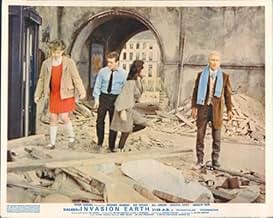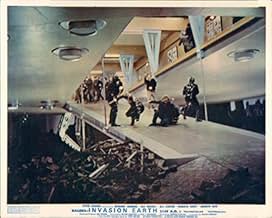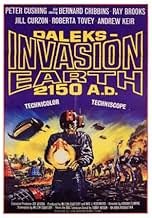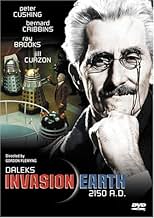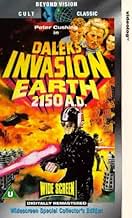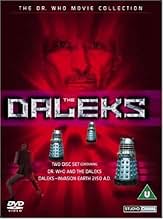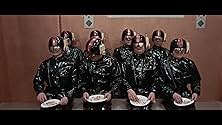Daleks il futuro tra un milione di anni
Titolo originale: Daleks' Invasion Earth 2150 A.D.
VALUTAZIONE IMDb
5,9/10
4852
LA TUA VALUTAZIONE
Aggiungi una trama nella tua linguaDr. Who and his companions arrive on Earth in the year 2150 AD, only to discover that the planet has been invaded and its population enslaved by the dreaded Daleks.Dr. Who and his companions arrive on Earth in the year 2150 AD, only to discover that the planet has been invaded and its population enslaved by the dreaded Daleks.Dr. Who and his companions arrive on Earth in the year 2150 AD, only to discover that the planet has been invaded and its population enslaved by the dreaded Daleks.
- Regia
- Sceneggiatura
- Star
Recensioni in evidenza
If I'd seen this film for the first time now, having seen most of the TV series that inspired it, I'm not sure I'd be fantastically keen on it. But I'd like to think that I'd still enjoy it for it's superficial scariness and complete indifference towards any aspect of a plot that might get in the way of the oh-so-colourful set-pieces.
I remember first seeing this film one Saturday morning, after all of the other childrens' programmes had finished and in retrospect, that's probably when it works best - the music's loud and harsh enough to wake you up, but the story's not too taxing if you're not completely with it yet.
Fantastic stuff, if you're prepared to leave your brain at home for 90 minutes.
I remember first seeing this film one Saturday morning, after all of the other childrens' programmes had finished and in retrospect, that's probably when it works best - the music's loud and harsh enough to wake you up, but the story's not too taxing if you're not completely with it yet.
Fantastic stuff, if you're prepared to leave your brain at home for 90 minutes.
Daleks-Invasion Earth: 2150 A.D. is directed by Gordon Flemyng and Milton Subotsky co-adapts the screenplay with Terry Nation and David Whitaker. It stars Peter Cushing, Bernard Cribbins, Ray Brooks, Andrew Keir, Jill Curzon and Roberta Tovey. A Technicolor/Techniscope production, with music by Barry Gray and Bill McGuffie and cinematography by John Wilcox.
A sequel to Dr. Who and the Daleks (1965), plot finds Cushing once again playing the Doctor, who after getting transported to 2150 A.D. finds London ravaged by the Daleks. The Daleks are turning humans into slave Robomen, but an underground human resistance offers hope. Can the Doctor and his companions aid the resistance and save Earth from Dalek damnation? Even though Dr. Who and the Daleks irked the Dr. Who fan base, understandably so since Amicus' version of the good Doctor is some way from the TV series version, it was enough of a success to warrant this sequel. You pretty much get a retread of the first film with the characterisations, Cushing's Doctor is a lovable old eccentric prof, two of his lady female relations are along for the ride (Tovey returning as the same character) and Cribbins has replaced Roy Castle as the light relief companion accidentally thrust into a chaotic world. The Daleks remain a unique and devilish foe, their voices unnerving and their colours vibrant in Technicolor.
Plot follows a familiar trajectory, much running, puffing, capture and escape histrionics, the good versus evil core booming throughout. The sets remain cheap, the effects basic but quaint, and the acting just about passes the test because everyone seems to be enjoying themselves and therefore performing it to the required standard. The music score is truly out of sync with the picture, at times it sounds like it belongs in a Carry On movie, at others an episode of The Avengers; in fact John Steed would have been a good addition to the plotting! But there is some darkness in the story, making it more potent than its prequel.
This wasn't as successful as the studio hoped, so a third film was shelved. If you aren't a hardcore Dr. Who fan and you can accept it on its own daft and fun terms? Then Daleks-Invasion Earth: 2150 A.D. is an enjoyable enough time filler. 6/10
A sequel to Dr. Who and the Daleks (1965), plot finds Cushing once again playing the Doctor, who after getting transported to 2150 A.D. finds London ravaged by the Daleks. The Daleks are turning humans into slave Robomen, but an underground human resistance offers hope. Can the Doctor and his companions aid the resistance and save Earth from Dalek damnation? Even though Dr. Who and the Daleks irked the Dr. Who fan base, understandably so since Amicus' version of the good Doctor is some way from the TV series version, it was enough of a success to warrant this sequel. You pretty much get a retread of the first film with the characterisations, Cushing's Doctor is a lovable old eccentric prof, two of his lady female relations are along for the ride (Tovey returning as the same character) and Cribbins has replaced Roy Castle as the light relief companion accidentally thrust into a chaotic world. The Daleks remain a unique and devilish foe, their voices unnerving and their colours vibrant in Technicolor.
Plot follows a familiar trajectory, much running, puffing, capture and escape histrionics, the good versus evil core booming throughout. The sets remain cheap, the effects basic but quaint, and the acting just about passes the test because everyone seems to be enjoying themselves and therefore performing it to the required standard. The music score is truly out of sync with the picture, at times it sounds like it belongs in a Carry On movie, at others an episode of The Avengers; in fact John Steed would have been a good addition to the plotting! But there is some darkness in the story, making it more potent than its prequel.
This wasn't as successful as the studio hoped, so a third film was shelved. If you aren't a hardcore Dr. Who fan and you can accept it on its own daft and fun terms? Then Daleks-Invasion Earth: 2150 A.D. is an enjoyable enough time filler. 6/10
I am a fan of the Doctor Who TV show, both in its original incarnation and in modern dress. I've also seen the two earlier movies and thought them odd and sad. I was therefore shocked and pleased to find this movie version of "The Dalek Invasion of the Earth" serial to be excellent. The pacing is better, the color photography by John Wilcox has its moments of beauty -- even the Technicolor Daleks have a peculiar beauty.
Working with only minor variations from the television serial, this demonstrates something I have long maintained: the writing on the TV DOCTOR WHO was often first rate. It was the cripplingly tiny budgets that often made it seem ridiculous, with its impossible shooting schedules, cardboard sets and monsters that frequently seemed to be a man lurking under a cast-off shag rug.
The memories of children often play them false in later years. People report on seeing a particular favorite DOCTOR WHO serial from childhood and being shocked at how much better it is in memory than looking at it as adults. Children assume the lovely details that the adult mind demands. How very pleasant for this adult to see them filled in here!
Working with only minor variations from the television serial, this demonstrates something I have long maintained: the writing on the TV DOCTOR WHO was often first rate. It was the cripplingly tiny budgets that often made it seem ridiculous, with its impossible shooting schedules, cardboard sets and monsters that frequently seemed to be a man lurking under a cast-off shag rug.
The memories of children often play them false in later years. People report on seeing a particular favorite DOCTOR WHO serial from childhood and being shocked at how much better it is in memory than looking at it as adults. Children assume the lovely details that the adult mind demands. How very pleasant for this adult to see them filled in here!
I sat through, and was utterly bored by, the first of the Peter Cushing/Dr Who movies, DR WHO AND THE DALEKS. It was a chore to sit through in places, a resolutely twee attempt to transfer the TV series to the big screen for children to enjoy. The good news is that this sequel is a different beast entirely, even though it brings back much of the same cast and crew (including the director).
Put simply, DALEKS INVASION EARTH: 2150 AD is an action-packed romp. If you think that scenes of Dalek war-bands patrolling the streets of a post-apocalyptic London sounds like a good time, then you'd be right. This is a film that sacrifices character set-up in favour of all out action, and it works a treat.
Cushing plays the crusty old buffoon once more, and the only reason he's not as irritating is because he's given far less screen time here. For most of the time his character is a mere observer, watching a guerrilla war between Ray Brooks (THE FLESH AND BLOOD SHOW) and his rebels and the Daleks and their goons. Bernard Cribbins contributes some comedy schtick, but he's nowhere near as irritating as Roy Castle was in the last one.
The technical effects are surprisingly decent, from the Dalek spaceships to the explosions, firefights, and large-scale destruction. Scenes of buildings collapsing are vivid and exciting and the Daleks are more of a menace here (and thankfully their voices aren't irritating anymore). There are lots of great visual moments, like the solitary Dalek rising out of the Thames or the humans vs. Dalek fight scenes. A rousing score and decent supporting cast serve as the icing on the cake here.
Put simply, DALEKS INVASION EARTH: 2150 AD is an action-packed romp. If you think that scenes of Dalek war-bands patrolling the streets of a post-apocalyptic London sounds like a good time, then you'd be right. This is a film that sacrifices character set-up in favour of all out action, and it works a treat.
Cushing plays the crusty old buffoon once more, and the only reason he's not as irritating is because he's given far less screen time here. For most of the time his character is a mere observer, watching a guerrilla war between Ray Brooks (THE FLESH AND BLOOD SHOW) and his rebels and the Daleks and their goons. Bernard Cribbins contributes some comedy schtick, but he's nowhere near as irritating as Roy Castle was in the last one.
The technical effects are surprisingly decent, from the Dalek spaceships to the explosions, firefights, and large-scale destruction. Scenes of buildings collapsing are vivid and exciting and the Daleks are more of a menace here (and thankfully their voices aren't irritating anymore). There are lots of great visual moments, like the solitary Dalek rising out of the Thames or the humans vs. Dalek fight scenes. A rousing score and decent supporting cast serve as the icing on the cake here.
The On Her Majesty's Secret Service of the Doctor Who world, the two Peter Cushing-Dalek films have seen occasional reappraisal that labels them as "coolly kitsch" or "lovably camp". In reality, of course, they're complete pants.
The Doctor Who TV series actually had a considerable integrity, despite being made on a budget of 50p and never managing to shake off the "Kid's Telly" tag. Here Cushing plays the Doctor of the title, his surname actually becoming "Who". The Tardis, his sophisticated space-time machine, is now "Tardis", a naff-looking thing with a Yale lock on the door. Around the time this was made a "Carry On" actor would do his only television work in the Doctor Who series Peter Butterworth as the Meddling Monk. For the film we got Bernard Cribbins as P.C. Tom Campbell, a similar character to the one that married the Doctor's granddaughter on TV. Though as the film Susan is only ten that would be inappropriate here.
Both films (the other Doctor Who and the Daleks, Cushing joined by Roy Castle) were based directly on actual TV stories, the novelty being they were in colour. By the time the second came around the novelty was over and it didn't do the business of the first, despite being someway the better film. Perhaps this is because the original serial The Dalek Invasion of Earth was an attempt to mount a film's epic scale on a TV budget. To this end it transfers better to the medium, and its setting (future Earth as opposed to the first film's alien planet Skaro) is more accessible to audiences.
The big failure is, of course, send-up. Some of the series' b-movie concepts (mutated nuclear war victims get robot-armoured shells and invade Earth to steal its core) are ludicrous, but played straight can be rewarding. The films make a mockery of the whole concept, showing a total lack of respect for their source material. My advice is: if you don't like 'em, don't make 'em. Bearing in mind the Daleks were hot merchandise properties at the time, this is a cynical cash-in on the nation's youth. There's even a shameless product placement for Sugar Puff Cereals.
All involved are capable of better. Peter Cushing, respected in adult horror films, here opts for a no-effort parody of TV Doctor William Hartnell's performance. There is no trace of depth or consideration for the part he has chosen. Full credit does go to Ray Brooks, Andrew Keir and Philip Madoc for at least trying to take it seriously. Madoc was rewarded with four seperate roles in the television series, most notably as mad scientist Solon (1976) and The War Lord (1969). On the plus side, direction in terms of camera angles is actually very, very good, but is offset by incidental music so loud and outdated that it works against the mood entirely. Think SF drama with Carry On music and you're almost there.
Bright and colourful, (including a funky red Dalek) the film certainly has visual appeal. But the Daleks' voices, their volume increased considerably, are extremely grating. They also lack their trademark warmth and charm, being little more than robots. Their weaponry was scheduled to be flame-throwers, but was disallowed due to the young audience. This is perhaps fortunate as their gas sprays aid the Nazi allegory. Best bit? The exploding shed.
Trite jazz, lame comic setpieces and binliner outfits, the film is on TV virtually every Bank Holiday in England. And you know the strangest part? As bad as it is, come next Bank Holiday I'll probably be tempted to see it again.
The Doctor Who TV series actually had a considerable integrity, despite being made on a budget of 50p and never managing to shake off the "Kid's Telly" tag. Here Cushing plays the Doctor of the title, his surname actually becoming "Who". The Tardis, his sophisticated space-time machine, is now "Tardis", a naff-looking thing with a Yale lock on the door. Around the time this was made a "Carry On" actor would do his only television work in the Doctor Who series Peter Butterworth as the Meddling Monk. For the film we got Bernard Cribbins as P.C. Tom Campbell, a similar character to the one that married the Doctor's granddaughter on TV. Though as the film Susan is only ten that would be inappropriate here.
Both films (the other Doctor Who and the Daleks, Cushing joined by Roy Castle) were based directly on actual TV stories, the novelty being they were in colour. By the time the second came around the novelty was over and it didn't do the business of the first, despite being someway the better film. Perhaps this is because the original serial The Dalek Invasion of Earth was an attempt to mount a film's epic scale on a TV budget. To this end it transfers better to the medium, and its setting (future Earth as opposed to the first film's alien planet Skaro) is more accessible to audiences.
The big failure is, of course, send-up. Some of the series' b-movie concepts (mutated nuclear war victims get robot-armoured shells and invade Earth to steal its core) are ludicrous, but played straight can be rewarding. The films make a mockery of the whole concept, showing a total lack of respect for their source material. My advice is: if you don't like 'em, don't make 'em. Bearing in mind the Daleks were hot merchandise properties at the time, this is a cynical cash-in on the nation's youth. There's even a shameless product placement for Sugar Puff Cereals.
All involved are capable of better. Peter Cushing, respected in adult horror films, here opts for a no-effort parody of TV Doctor William Hartnell's performance. There is no trace of depth or consideration for the part he has chosen. Full credit does go to Ray Brooks, Andrew Keir and Philip Madoc for at least trying to take it seriously. Madoc was rewarded with four seperate roles in the television series, most notably as mad scientist Solon (1976) and The War Lord (1969). On the plus side, direction in terms of camera angles is actually very, very good, but is offset by incidental music so loud and outdated that it works against the mood entirely. Think SF drama with Carry On music and you're almost there.
Bright and colourful, (including a funky red Dalek) the film certainly has visual appeal. But the Daleks' voices, their volume increased considerably, are extremely grating. They also lack their trademark warmth and charm, being little more than robots. Their weaponry was scheduled to be flame-throwers, but was disallowed due to the young audience. This is perhaps fortunate as their gas sprays aid the Nazi allegory. Best bit? The exploding shed.
Trite jazz, lame comic setpieces and binliner outfits, the film is on TV virtually every Bank Holiday in England. And you know the strangest part? As bad as it is, come next Bank Holiday I'll probably be tempted to see it again.
Lo sapevi?
- QuizPeter Cushing supposedly only agreed to do this film if Roberta Tovey returned as his grand-daughter alongside him, having built up a rapport on the previous film.
- BlooperThe Dalek in the Thames does not flash its lights when addressing the Robomen, as the casing did not contain an operator.
- Versioni alternativeSome versions of the film open with the credits sequence before switching to Tom's night-time street patrol. The original version opens with the raid, then the titles, then Tom's awakening in TARDIS.
- ConnessioniFeatured in Movie 4: Invasion Earth, 2150 A.D. (1972)
I più visti
Accedi per valutare e creare un elenco di titoli salvati per ottenere consigli personalizzati
- How long is Daleks' Invasion Earth 2150 A.D.?Powered by Alexa
Dettagli
- Data di uscita
- Paese di origine
- Lingua
- Celebre anche come
- Dr. Who: Daleks Invasion Earth 2150 A.D.
- Luoghi delle riprese
- Slipway, Battersea Church Road, Battersea, London, Greater London, Inghilterra, Regno Unito(Dalek rising out of the river)
- Aziende produttrici
- Vedi altri crediti dell’azienda su IMDbPro
Botteghino
- Budget
- 286.000 £ (previsto)
- Lordo in tutto il mondo
- 115 USD
Contribuisci a questa pagina
Suggerisci una modifica o aggiungi i contenuti mancanti



